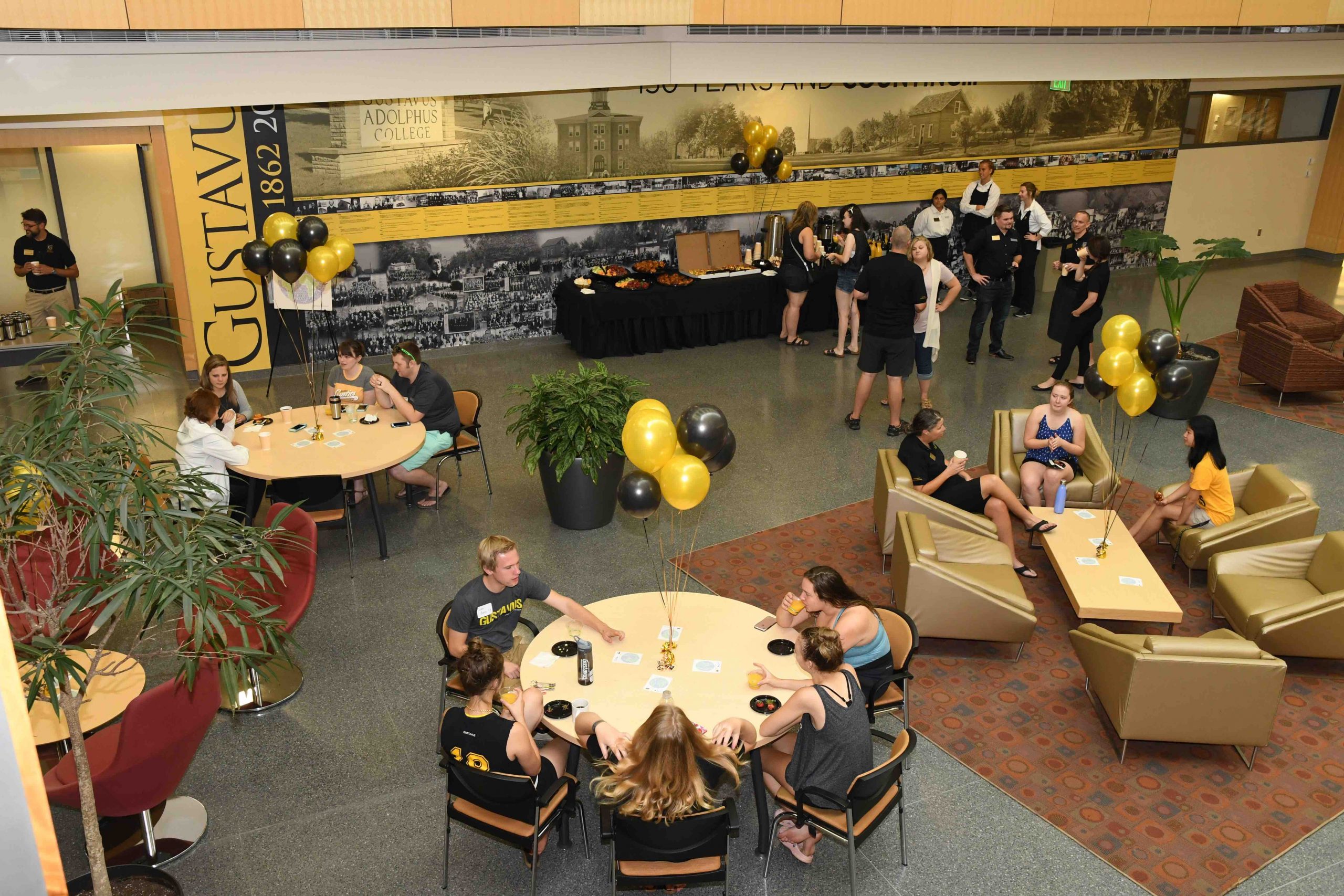The Gustavus Adolphus College Department of Communication Studies was recognized by the Association of American Colleges and Universities (AAC&U) this week as a leader among programs that intentionally and successfully integrate civic responsibility in their majors. Communication studies at Gustavus is one of 22 departments at institutions across the country that have been honored as a model for making civic learning and democratic engagement an expectation for all students who major in that discipline.
Supported by a grant from the Endeavor Foundation, the AAC&U’s initiative aims to limit the civic-free zones of many academic departments by providing guidance to colleges and universities as they tackle one of their most resistant, yet fertile, areas of civic learning by bringing it squarely into where students invest most of their academic attention: their majors.

“Recognition by AAC&U is a great honor and a testament our hard work in reimagining our curriculum to provide the best possible undergraduate liberal arts experience to serve our students and society,” Gustavus communication studies professor and department chair Leila Brammer said. “We have very intentionally developed a variety of curricular experiences that put theory into real-world practice in the community. Through these experiences, students develop advanced understanding of communication and community engagement and hone essential skills for personal, professional, and civic success.”
The path to the communication studies department’s honor stretches back nearly 15 years, when faculty members began to develop and hone civic leadership and social justice opportunities within the curriculum. One of the most transformative results of this curricular redesign is the department’s flagship civic engagement class, Public Discourse, which recently celebrated its 10th anniversary. The course, in which students choose an issue in their community, research it thoroughly, identify ways that other communities have dealt with similar problems, collaborate with community members in determining the best path forward, and ultimately advocate for the community to take action, has educated over 2,000 Gustavus students since the program began.
“Public Discourse develops liberal arts skills—community-based research, critical thinking, argument, and advocacy—and the sense of empowerment and responsibility necessary for future work with communities,” Brammer explained. “This experience also teaches the humility and collaboration required to fully understand a problem and possible ways to address it before acting and empowers students to see themselves as citizens with responsibilities within their communities.”
Since this intentional curricular focus on civic engagement began, the department has built courses that reinforce and advance the lessons that students learn in Public Discourse, which is often completed during the first year.

Today, community-based coursework can be found in communication studies classes such as Community Advocacy, Video Representation, Deliberation, Media and Democracy, Argumentation, Conflict, Intercultural Communication, Organizational Communication, Crisis Communication, and the Senior Seminar. In addition, the department recently launched a Public Deliberation and Dialogue Program that aims to more fully engage students across campus and provide a resource to community organizations from across the region. The new program will infuse dialogue and deliberation training throughout the campus to prepare students to work with each other and in their communities to lead, support, and collaborate in evidence-based decision making processes.
“The recognition by AAC&U of our communication studies department reiterates what our students and faculty have seen as a preeminent education with the ability to affect change in our community,” associate provost and dean of arts and humanities Micah Maatman said. “This model of engaged civic learning is a hallmark of a Gustavus education that nearly half of our students participate in during the academic year. Moving students’ education outside the classroom has partnered students with community nonprofit organizations to help articulate solutions to problems or to collaborate with public and private agencies to monitor the water quality of the Minnesota River, among many other examples.”
The AAC&U designation is one of several national honors communication studies has received in recent years, including the National Communication Association‘s 2014 Outstanding Basic Course award and the 2013 Rex Mix Department of Distinction Award in the Undergraduate College and University Section.
As the department looks to the future, civic engagement will continue to be a mainstay of the curriculum.
“Our Public Deliberation and Dialogue program builds upon our success as a national leader in civic learning. Across campus and the region, students and community members will learn the principles and practices to engage conversations necessary to address our most challenging problems.” Brammer said. “Collaborative community-based learning empowers students with real world experience, skills, and confidence to succeed in their personal, professional, and civic lives.”
More information about the AAC&U list of 22 institutions that integrate civic responsibility by design into majors and the supporting Endeavor Foundation grant can be found on the AAC&U website.
 AAC&U is the leading national association concerned with the quality, vitality, and public standing of undergraduate liberal education. Its members are committed to extending the advantages of a liberal education to all students, regardless of academic specialization or intended career. Founded in 1915, AAC&U now comprises nearly 1,400 member institutions—including accredited public and private colleges, community colleges, research universities, and comprehensive universities of every type and size.
AAC&U is the leading national association concerned with the quality, vitality, and public standing of undergraduate liberal education. Its members are committed to extending the advantages of a liberal education to all students, regardless of academic specialization or intended career. Founded in 1915, AAC&U now comprises nearly 1,400 member institutions—including accredited public and private colleges, community colleges, research universities, and comprehensive universities of every type and size.
Information about AAC&U membership, programs, and publications can be found at www.aacu.org.

Leave a Reply
You must be logged in to post a comment.